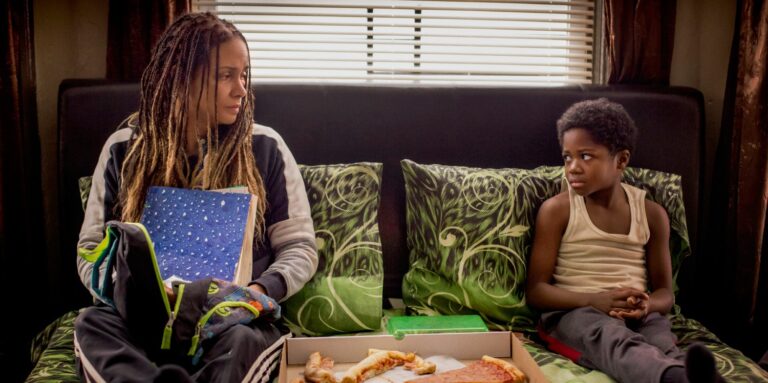Nearly two decades after becoming the first Black woman to win the Oscar for Best Actress, Halle Berry takes on arguably her biggest challenge yet, stepping behind the camera for Bruised, which follows a once-promising MMA fighter attempting to mount a comeback just as her personal life is thrown into upheaval. Packed with the usual sort of trope and cliches one might expect from a sports drama, the film nevertheless succeeds not because of Berry’s directorial prowess (which is fine, if not particularly inspired), but due to her exceptional work in front of the camera, in her strongest performance since her Oscar-winning role in Monster’s Ball.
Berry portrays Jackie Justice, whose meteoric rise through the ranks of the UFC was derailed when her manager/boyfriend Desi (Adan Canto) goaded her into a fight for which she was grossly unprepared, resulting a beating so severe she fled from the cage mid-bout. Four years later, Jackie scrubs toilets and drinks too much, while insisting she has no desire to return to the ring. But when Desi takes her to an underground fight club and an altercation with the reigning ass-kicker provides Jackie with an outlet for years or pent-up rage, big time fight promoter Immaculate (Shamier Anderson) takes notice. He urges Jackie to come train at his gym under the tutelage of Buddhakan (Sheila Atim), promising a path back to stardom if she’s willing to put in the work.
So far, it’s fairly rote stuff for the genre: a washed-up athlete trying to prove to the world — and herself — that the final chapter of her story hasn’t yet been written. This setup could have carried Bruised on its own, but the script from Michelle Rosenfarb introduces some additional complications in the guise of Jackie’s estranged mother Angel (Adriane Lenox), who arrives with the news that Jackie’s six-year-old son Manny (Danny Boyd Jr.) has just lost his father to gun violence. Jackie hasn’t seen the boy in years, and the responsibility of figuring out how to be a mother while undergoing the brutal training regiment necessary to mount an in-ring comeback might be more than she can manage.
The bulk of the familial moments are steeped so heavily in melodrama they often border on absurdity, but the film comes alive whenever Jackie’s relationship with Manny takes center stage. Trauma at witnessing his father’s death has left Manny completely mute, but Boyd Jr. conveys a tremendous amount of emotion without ever uttering a word, and viewers may find their hearts leaping into their throats when Jackie puts herself in harm’s way to protect her son from the threat of domestic violence. Elsewhere, the unease with which Jackie regards Buddhakan’s stern instruction gradually gives way to respect, then trust, then something else altogether, and Berry lays bare all of Jackie’s doubts and fears and vulnerability as she experiences what might be her first genuine human connection that didn’t originate in dysfunction.
The climactic bout between Jackie and undefeated Women’s Flyweight Champion “Lady Killer” (real-life UFC title holder Valentina Shevchenko) is a banger, and Berry leverages her long-time fandom of MMA fighting to showcase the sport’s brutality and beauty in equal measure. With Jackie unable to go punch-for-punch with her younger, stronger and faster opponent, she relies on a strategy of takedowns, reversals and submission maneuvers, and Bruised frames the contest in a way that almost feels balletic. The final moments are as bereft of surprises as the rest of the film, but Berry’s presence is so magnetic and her performance is so convincing that she makes the experience feel like more than just the sum of its parts.

